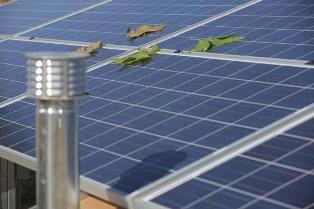Crystalline solar panels consist of multiple solar cells arranged in series on a panel. These solar cells are made of thin layers of silicon crystals that are "doped," meaning intentional impurities have been added to the silicon. When light particles (photons) hit the layer, their energy knocks electrons out of their orbit. This movement of electrons through the material generates electricity.

The electricity flows from cell to cell via electrodes that connect them. All solar cells are linked in series to create the total voltage for the entire panel. When the positive and negative terminals of the panel are connected, an electrical circuit is formed. This produces direct current (DC), which always flows in one direction from positive to negative.
The electricity generated by solar panels needs to be converted from direct current (DC) to alternating current (AC) to be suitable for home use. This is done by an inverter, which adjusts the voltage to match the 230-volt Dutch electricity grid.
Solar panels respond directly to sunlight. The more sunlight they receive, the more electricity they generate. Even on cloudy days, they still produce energy, although less than on sunny days.


If a solar panel is in the shade, it receives less light and generates less electricity. Since solar panels are often connected in series, a single shaded panel can reduce the performance of the entire string. To counter this, solar panels are equipped with bypass diodes that reroute electricity around shaded areas.
Solar panels do not have visible indicators like lights or sounds to show they are functioning. The simplest way to check their performance is via the inverter. Many inverters have a display or indicator light showing their operation and energy output.
Another method is to check your electricity meter. Smart meters display the amount of electricity being fed back into the grid. However, not all generated electricity is fed back, as some is directly consumed in the home.
To ensure your solar panels are operating at peak efficiency, compare their actual output with the expected output. A yield estimate is often provided when purchasing a system. If not, you can estimate it based on the peak power of your panels.
A well-positioned system facing south with a 30-degree tilt in the Netherlands produces about 850 kWh per kWp per year. Deviations in orientation or tilt angle can reduce this output.
If your solar panels are not performing well, contact your installer. They can check for issues and replace components if necessary. Solar panels and inverters often come with long warranty periods.
If your original installer is unavailable, another installer can inspect the system. A "solar panel check-up" can help detect and resolve potential defects.